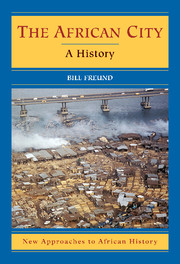Book contents
- Frontmatter
- Contents
- PREFACE
- 1 Urban Life Emerges in Africa
- 2 African Cities and the Emergence of a World Trading Economy
- 3 Colonialism and Urbanisation
- 4 Cities in Revolt: The Long-Term Crisis of South African Urbanism
- 5 The Post-Colonial African City
- 6 Globalisation and the African City: Touba, Abidjan, Durban
- INDEX
5 - The Post-Colonial African City
Published online by Cambridge University Press: 05 June 2012
- Frontmatter
- Contents
- PREFACE
- 1 Urban Life Emerges in Africa
- 2 African Cities and the Emergence of a World Trading Economy
- 3 Colonialism and Urbanisation
- 4 Cities in Revolt: The Long-Term Crisis of South African Urbanism
- 5 The Post-Colonial African City
- 6 Globalisation and the African City: Touba, Abidjan, Durban
- INDEX
Summary
In this chapter, we shall consider how African cities seem to be shaping up as colonial rule passes out of memory. Urban growth now has proceeded at such a pace that a large percentage of all Africans today are town dwellers. This places them in a pattern which is discernable on every continent. However, major issues unfold in examining the post-colonial city in Africa which are not exactly universal. If African society is shaped by rural survival strategies and rural identities, what impact does life in big cities especially have? How can cities in Africa cope with their burgeoning populations when rapid industrialisation and economic development have failed to take place? Current world economic trends, bunched together in many accounts as “globalisation,” marginalise Africa and with it, make the management of cities that work effectively for their inhabitants in Africa impossible to support financially in particularly bleak scenarios. There is no lack of literature that sees African cities as essentially dysfunctional and dangerous places. Contemporary Africa certainly has examples of city life that are nightmarish. However, there is also a counter-trend which highlights the economic rationality of much activity in African cities and sees them as well as the fount of cultural creativity as older rural-based ways of life fade or contain radically new elements. In this sense, the seed of a new Africa that can overcome present dilemmas lies there.
- Type
- Chapter
- Information
- The African CityA History, pp. 142 - 169Publisher: Cambridge University PressPrint publication year: 2007



